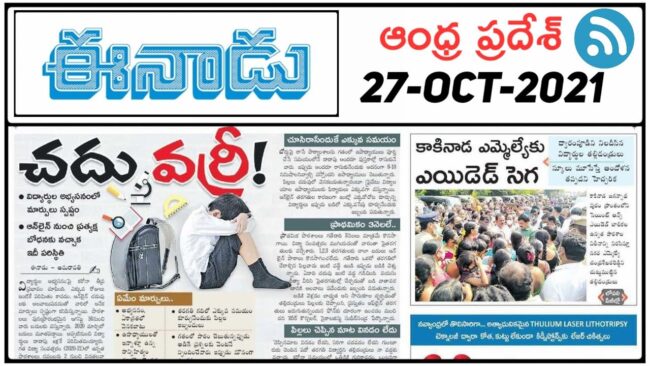Introduction The Eenadu Sunday Book is more than a weekend read—it’s a cultural institution. Appearing every Sunday alongside the renowned Eenadu
Introduction
The Eenadu Sunday Book is more than a weekend read—it’s a cultural institution. Appearing every Sunday alongside the renowned Eenadu newspaper, this special supplement brings with it a blend of knowledge, creativity, tradition, and entertainment, all wrapped in the rich rhythm of the Telugu language.
For decades, the Eenadu Sunday Book has played a vital role in informing readers, nurturing young talent, promoting regional literature, and encouraging thoughtful reflection. Whether you’re a student, a homemaker, a retired teacher, or a curious teenager, chances are you’ve leafed through its pages, absorbed its stories, solved its puzzles, or read an article that stayed with you.
In this article, we take a closer look at the significance of the Eenadu Sunday Book—how it educates, entertains, and evolves to remain relevant in today’s rapidly changing media environment.
The Foundation: A Vision for Well-Rounded Journalism
The Eenadu Sunday Book was launched with a vision to offer something beyond news—something that speaks to the heart, stimulates the mind, and engages every generation in a family.
The idea was simple: provide meaningful, quality weekend content that resonates with the Telugu-speaking public. But its impact has been far-reaching, with readers eagerly awaiting the supplement each week. Over time, it has helped:
- Promote regional authors and poets
- Encourage Telugu language use across generations
- Foster a reading habit in rural and urban households alike
- Support student learning with analytical essays and career columns
This balance of entertainment and education is what gives the Sunday Book its unique and enduring charm.
Structure and Content: More Than a Newspaper Supplement
Every Sunday, readers are treated to a thoughtfully curated selection of content. Here’s what typically fills the pages of the Eenadu Sunday Book:
1. Fiction and Short Stories
One of the most beloved parts of the Book, these narratives often explore themes of love, family, sacrifice, ethics, and rural life. The stories range from contemporary slices of life to morality-based tales, encouraging emotional connection and introspection.
2. Poetry and Literature
A platform for classic and modern Telugu poetry, the Sunday Book helps preserve linguistic richness and poetic expression. It often features work from both seasoned poets and young voices—bridging generational gaps.
3. Educational Columns
A standout feature, especially for students, includes:
- Case studies and real-life scenarios
- Informative essays on science, history, economics
- Personality development and exam preparation guidance
This content supports school curricula and is widely used by aspirants of competitive exams like Group-I, UPSC, and banking tests.
4. Cultural Articles
From festivals and folk traditions to profiles of legendary artists, musicians, and writers, these articles celebrate Telugu heritage while teaching readers about their roots.
5. Puzzle & Fun Sections
Every edition includes crosswords, riddles, quizzes, and brain teasers—a fun way for families to bond and stimulate critical thinking, especially for children.
6. Interviews & Profiles
Occasionally, the Book features in-depth interviews with authors, educators, and thinkers, offering insights into personal journeys, social movements, or the changing landscape of arts and education.

Impact on Regional Journalism and Language Preservation
The Eenadu Sunday Book stands as a pillar of vernacular journalism—highlighting the importance of publishing quality content in native languages.
Unlike mainstream digital platforms that often prioritize clickbait or viral trends, the Sunday Book:
- Encourages deep reading and long-form storytelling
- Upholds the aesthetics and purity of Telugu language
- Promotes critical thinking and balanced opinion formation
By nurturing regional content and storytelling, it keeps Telugu literature vibrant and evolving, while offering a refreshing contrast to the fast-paced, fragmented consumption of information in modern media.
Role in Education and Youth Development
In recent years, the Eenadu Sunday Book has become a go-to tool for academic enrichment. Here’s how:
a. Case-Based Learning
Articles often explore real-life challenges, decision-making situations, or social case studies. These help students:
- Improve reading comprehension
- Develop analytical thinking
- Understand social and ethical dilemmas
b. General Knowledge
Content related to science, innovation, famous personalities, and historical events are presented in accessible Telugu—making it easier for non-English medium students to grasp concepts.
c. Model Essays and Language Development
Aspiring writers and students preparing for exams benefit from reading well-structured essays in proper Telugu. This helps:
- Build vocabulary
- Learn essay-writing techniques
- Understand sentence structure and paragraph flow
d. Career Guidance
Columns occasionally feature expert advice on choosing the right career, preparing for interviews, or applying to competitive exams—filling a major gap in rural education resources.
A Cultural Bridge Across Generations
The Eenadu Sunday Book has something for everyone. Grandparents find nostalgia in poetry and folk tales; parents enjoy essays on society and family; children are drawn to games and stories.
It becomes a shared family experience—a rare thing in today’s screen-dominated households. Many families have made it a Sunday habit to read and discuss articles together, making it more than just reading material—it becomes part of family bonding and cultural continuity.
The Shift to Digital and Global Readership
With the rise of smartphones and tablets, Eenadu has wisely expanded its reach through digital editions. The Sunday Book is now available via:
- Eenadu E-paper (mobile & web)
- App-based reading platforms
- PDF downloads for offline access
This shift has opened up access to:
- Telugu-speaking diaspora around the world
- Students in remote areas without regular newspaper delivery
- Working professionals who prefer reading on the go
The digital edition retains the full layout and features of the print version, ensuring readers don’t miss out on any content.
Reader Involvement: A Two-Way Conversation
One of the reasons behind the Sunday Book’s lasting popularity is its interactive spirit. It frequently features:
- Letters to the editor from loyal readers
- Feedback sections on recent stories or articles
- Reader-submitted stories and poems
This inclusion of public voices transforms the Sunday Book into a community platform, giving readers a sense of ownership and pride.
The Challenges Ahead
While its legacy is strong, the Sunday Book does face modern challenges:
1. Competing with Instant Media
Younger audiences are gravitating toward video content, reels, and memes. Getting them to read long-form essays or literary pieces takes effort.
2. Language Shift
As more young people grow up in English-dominated environments, Telugu reading fluency is declining.
3. Maintaining Print Relevance
Though print readership remains significant, the digital transition must be smoother and more interactive to retain attention.
Future Possibilities
To stay relevant and expand its influence, the Eenadu Sunday Book could explore:
- Interactive Digital Features: Audio narration of stories, clickable explanations, or animated illustrations.
- Workshops and Contests: Story writing competitions for school students or interviews with young writers.
- Themed Editions: Monthly themes like “Environment,” “Women’s Voices,” or “Rural Stories.”
- School Collaborations: Partnering with schools to use Sunday Book content in class discussions or language labs.
FAQs
1. Is the Eenadu Sunday Book a separate publication?
It’s a weekly supplement that comes with the Eenadu Sunday newspaper but is also widely read as a standalone feature.
2. What type of content does it include?
Short stories, essays, poetry, puzzles, interviews, educational articles, cultural features, and reader submissions.
3. Is it available in digital format?
Yes, through Eenadu’s e-paper and app, you can read the full Sunday Book digitally.
4. Can students use it for exam prep?
Absolutely. It offers essay samples, case studies, and GK articles that help with competitive exams and schoolwork.
5. Who can submit content?
Both professional writers and general readers can submit short stories, poems, or feedback. Selection is editorial.
6. Is it only for Telugu speakers?
Yes, it’s written entirely in Telugu, aimed at preserving and promoting the language.
7. Is the content the same in digital and print?
Yes, both versions carry the same articles, puzzles, and features.
8. Can I access past editions?
Archived e-paper editions are available online for a limited time.
9. Does it support rural readership?
Very much so. Its simple language, local themes, and educational focus make it ideal for rural and small-town readers.
10. What makes it special?
Its unique mix of education, entertainment, cultural preservation, and community connection makes it more than just a newspaper feature—it’s a weekly experience.
Conclusion
The Eenadu Sunday Book stands as a vibrant symbol of regional journalism done right. It educates while it entertains, connects while it informs, and inspires while it reflects. In an age where speed often replaces substance, the Sunday Book reminds us of the enduring power of the written word—especially in our mother tongue.
Whether you’re solving a riddle with your child or reading a thoughtful essay with your morning coffee, the Eenadu Sunday Book is a gentle but powerful reminder of what makes reading meaningful, local, and lasting.
More Info: infromednation




COMMENTS